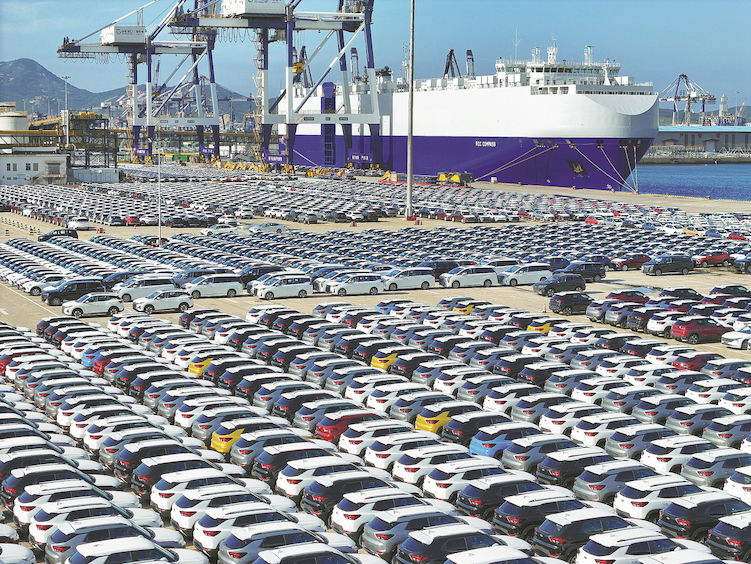Chinese carmakers have called for “firm countermeasures” against imported fuel-powered vehicles from Europe, including a 25% tariff, according to state media reports on Wednesday.
At a closed door meeting, also attended by European carmakers on Tuesday, China’s auto industry “called on the government to adopt firm countermeasures” against recent tariffs announced by the EU, state-backed Global Times newspaper said on Wednesday.
Separately, another state-backed newspaper China Daily reported that some Chinese firms called for import tariffs to be increased to 25%, which would be within the scope of WTO rules.
Also on AF: European Farmers Fear Trade War With China Over EV Tariffs
The meeting, organised by China’s Ministry of Commerce, was held in Beijing and attended by SAIC, BYD, BMW, Volkswagen, and Porsche, two people with direct knowledge of the matter told Reuters.
The meeting was also attended by Mercedes-Benz, Stellantis and Renault, two separate sources familiar with the matter said.
The main aim of the meeting was to put pressure on Europe and lobby against the tariffs, they added.
According to the China Daily report, automakers at the meeting also accused the European Union of “abusing its investigative power” to “spy on China’s new energy vehicle technology.”
The EU investigation required Chinese companies to share “core secrets” such as battery composition, supplier information and other “core business and operational secrets,” the report alleged.
The EU’s anti-subsidy investigation was “more like a ‘comprehensive survey’ of the core competitiveness of China’s new energy vehicle companies,” China Daily said.
“There are many European brand companies here. If you are asked by the Chinese government to provide such information in some form, what will you do?” one Chinese automaker was quoted as asking at the meeting on Tuesday.
The report went on to say that the European Union was looking to identify the key to “the competitive advantage of Chinese electric vehicle companies… in the name of an investigation.”
Policy through state media
Chinese authorities have previously hinted at possible retaliatory measures through state media commentaries and interviews with industry figures.
The Global Times first reported late last month that a Chinese government-affiliated auto research centre was suggesting China raise its import tariffs on imported gasoline (petrol) sedans and sport utility vehicles with engines larger than 2.5 litres to 25%, from the current rate of 15%.
The same newspaper last month also hinted that Chinese companies planned to ask authorities to open an anti-dumping investigation into European pork products, which China’s commerce ministry on Monday announced it would undertake.
It has also urged Beijing to look into EU dairy imports.
‘Mutually agreeable solution’
While the European Commission has announced anti-subsidy duties of up to 38.1% on imported Chinese EVs from July, there is still scope of dialogue between the two regions, as the EU process allows for review.
And industry insiders say both Europe and China have reasons for wanting to strike a deal in the months ahead to de-escalate tensions and avoid the addition of billions of dollars in new costs for Chinese EV makers.
The European Commission said on Wednesday it was looking into the situation “with a view to discussing if a mutually agreeable solution can be found.”
EU car exports to China were worth 19.4 billion euros ($20.8 billion) in 2023, while the bloc bought 9.7 billion euros of electric vehicles from China, according to EU statistics agency figures.
China accounts for about 30% of German carmakers’ sales, and Germany is by far the largest exporter of vehicles with engines of 2.5 litres or above, having shipped $1.2 billion worth to China since the beginning of this year, Chinese customs data shows.
Mercedes Benz’s big-sized GLE Class SUV, S Class sedans and Porsche’s Cayenne are the three most popular imported cars from Europe in China, the three of which accounted for more than one-fifth of the total 155,841 imported cars of European brands in the first five months, according to data tracked by China Merchants Bank International.
- Vishakha Saxena, with Reuters
Also read:
China’s Probe Into EU Pork ‘Dumping’ Seen as Trade Retaliation
EU Tariff Fallout: China Warns of WTO Suit, Tesla to Hike Prices
After Much Planning, China’s EV Makers Set to Storm Europe
Stellantis CEO Calls China EV Tariffs a ‘Trap’. He May Be Right
As EU Eyes Tariffs, European States Chase China EV Factories
EU Vows to Stem ‘Unfair Competition’ With New China Subsidy Probe
China’s Free Trade Olive Branch to EU Amid Subsidy Probes
BYD’s First Vehicle Charter Sets Sail for Europe Loaded With 5,000 EVs























